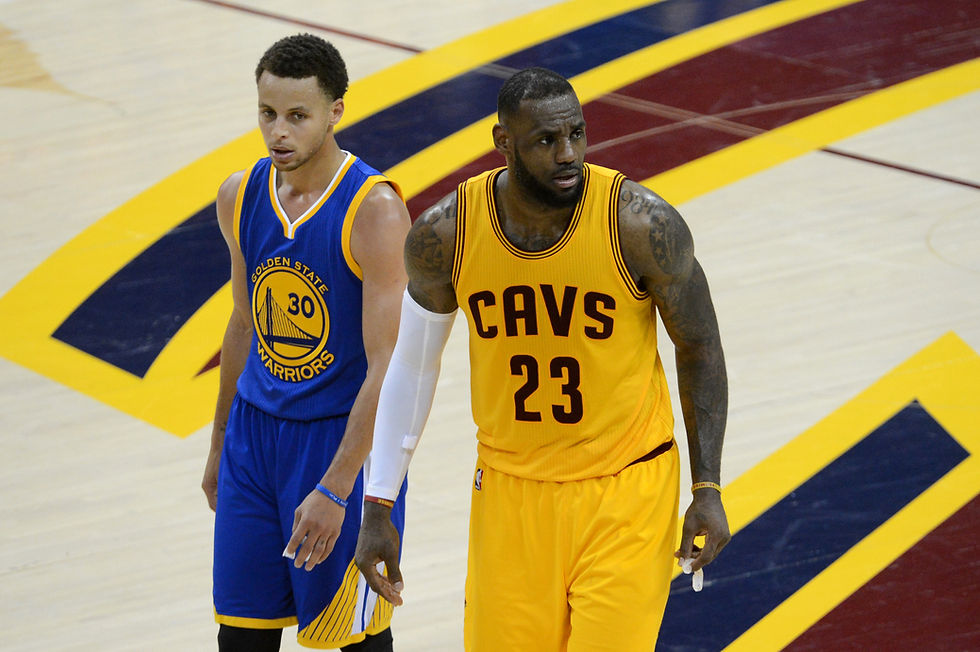A Historical Perspective on LeBron's Dominance
- Kyle Goff
- Jun 15, 2015
- 3 min read

*Photo via NBC.com
Remember the last time LeBron James matched up against a player that was supposed to be in his stratosphere in the NBA Finals? By the time the Oklahoma City Thunder matched up against the Miami Heat in 2012, Kevin Durant was universally considered the second best player in the world. Durant was great in that series, but LeBron showed us just how big the gap between the best and the second best really was. He's doing it again.
Stephen Curry was the league’s most valuable player this season and clearly the best player on the best team. He should be able to show he is a close second to LeBron in this series, right? He is not even close. In fact, no one in history may be close to this version of King James.
You can argue that no player in NBA history has been this important to a team's success. I am not one for analytics. The eye test shows LeBron’s brilliance, but the stats solidify it. An easy way to measure just how important a player’s importance to his team is usage percentage, a number of a team’s offensive plays a player is used on, whether by shooting, creating a shot for a teammate, or turning the ball over. After last night’s Game 5, LeBron’s usage rate was 41.3 percent, according to basketball-reference.com. Curry has a much lower figure in the finals, 30.1. He benefits from more useful teammates than James. Despite having much less talented teammates and not being a point guard, LeBron provides 55 percent of his teams’ assists. Curry, a point guard, only contributed to 27 percent of his teams. LeBron has always made his teammates better but maybe never to this extent. In Game 5, J.R. Smith and Iman Shumpert scored 24 points, 23 of them were assisted by LeBron. His supporting cast got 19 uncontested shots, 11 were off LeBron passes (eight of 11 on those attempts). He scored or assisted on 81.3% of the Cavs' field goals. James scored 15 in the fourth quarter and kept his team within striking distance until Curry led a late barrage, scoring 17 of his own in the final twelve minutes. It was somewhat of a breakout game for Curry as he scored a series high 37 points. It marked the first game in the series Curry looked like the MVP.
But anyone who has any knowledge of the game knows who the MVP of this series is. Jerry West is the only player in NBA history that has been awarded the MVP as a member of the losing team. With LeBron’s 40 point, 14 rebound, and 11 assist Game 5, he joined West as the only player with a 40 point triple-double in the NBA Finals. West had 42, 13, 12 in the Lakers' 108-106 Game 7 loss to the Celtics on May 5, 1969. This stat line was not out of the norm. LeBron is averaging 34.8 points, 13.5 rebounds, 9.5 assists, and 1.5 steals. Since 1985, there have been eleven 35-point, eight rebound, six assist games in the finals. Three of them have been by LeBron James in this series. He now has six NBA Finals triple-doubles for his career, only two behind Magic Johnson’s all time record.
After the extra day of rest, LeBron looked fresh to start Game 5. He had an energy about him that was absent in the Game 4 loss. He has taken his game to another level in the NBA Finals, but he is shouldering a bigger burden than ever. Golden State's strategy to wear him down is working. James was only seven for 19 in the second half. This has become a trend in the series. And as LeBron goes down the stretch, the Cavs go. Cleveland has been outscored by 37 points in fourth quarters throughout the series.
With LeBron averaging 45.6 minutes in the series, one must ask themselves how much James has left in the tank. Even if the 3-2 series deficit is too much to overcome, LeBron has showed us a historical dominance that is hard to even put in perspective.
http://www.basketball-reference.com/players/j/jamesle01/gamelog/2015/
http://insider.espn.go.com/nba/hollinger/statistics/_/sort/usageRate/seasontype/3
http://espn.go.com/nba/playoffs/2015/story/_/id/13071387/lebron-james-unfathomable-workload




Comments